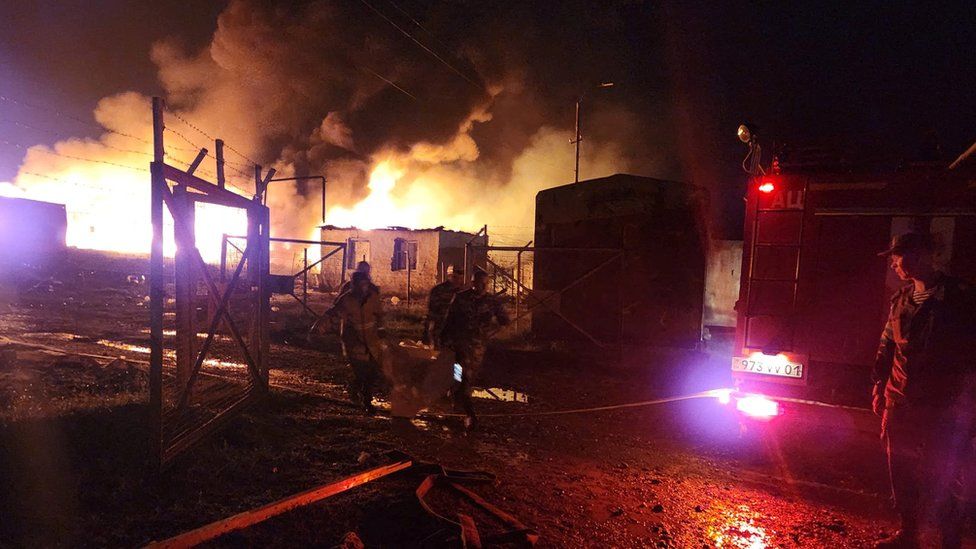An explosion at a fuel depot in Azerbaijan’s Nagorno-Karabakh has killed 20 people and injured hundreds more, local Armenian authorities say.
Nearly 300 people were admitted to hospitals, with dozens of them “still in critical condition”.
It comes as the Armenian government said 13,350 refugees crossed into the country from the enclave.
The disputed Nagorno-Karabakh region is home to a majority of some 120,000 ethnic Armenians.
It is not yet clear what caused the explosion on Monday evening in the main city of Stepanakert.
Human Rights Ombudsman Gegham Stepanyan wrote on social media: “As a result of the explosion in the fuel warehouse, the number of injured exceeds 200.
“The health condition of the majority is severe or extremely severe. The medical capacities of Nagorno-Karabakh are not enough.”
In a statement on Tuesday local officials said 13 unidentified bodies were found at the scene and seven more died in hospital.
Since Azerbaijan’s seizure of Nagorno-Karabakh last week, thousands of people have left the area after the Armenian government in Yerevan announced plans to move those made homeless by the fighting.
This video can not be played
To play this video you need to enable JavaScript in your browser.
Armenia’s Prime Minister Nikol Pashinyan has said that ethnic cleansing is “under way” in the region.
“That’s happening just now, and that is very unfortunate fact because we were trying to urge international community on that,” Nikol Pashinyan told reporters.
Azerbaijan has said it wants to re-integrate the ethnic Armenians as “equal citizens”.
The BBC has spoken to some of the refugees who arrived in the city of Goris in Armenia on Sunday, close to the border to Karabakh.
“I gave my whole life to my homeland,” said one man. “It would be better if they killed me than this.”
A woman, Veronica, told the BBC that this was the second time she had become a refugee. The first time was during the conflict in 2020.
Envoys from Armenia and Azerbaijan are due to meet in Brussels on Tuesday for European Union-backed talks.
It will be the first time diplomatic talks are held since Azerbaijan seized the enclave last week.
The two sides will be represented by their national security advisors.
- Explained: Conflict in Nagorno-Karabakh
- Panic in Karabakh as people fear ethnic cleansing
- Spoils of Karabakh war paraded as aid trickles in
Nagorno-Karabakh – a mountainous region in the South Caucasus – is recognised internationally as part of Azerbaijan, but has been controlled by ethnic Armenians for three decades.
The enclave has been supported by Armenia – but also by their ally, Russia, which has had hundreds of soldiers there for years.
Five Russian peacekeepers were killed – alongside at least 200 ethnic Armenians and dozens of Azerbaijani soldiers – as Azerbaijan’s army swept in last week.
This video can not be played
To play this video you need to enable JavaScript in your browser.
On Sunday, Azerbaijan’s defence ministry said it had confiscated more military equipment including a large number of rockets, artillery shells, mines and ammunition.
Despite Azerbaijan’s public reassurances, there are fears about the residents of Nagorno-Karabakh, with only one aid delivery of 70 tonnes of food having been allowed through since separatists accepted a ceasefire and agreed to disarm.
Ethnic Armenian leaders say thousands are without food or shelter and sleeping in basements, school buildings or outside.
Armenia-Azerbaijan: Nagorno-Karabakh map


